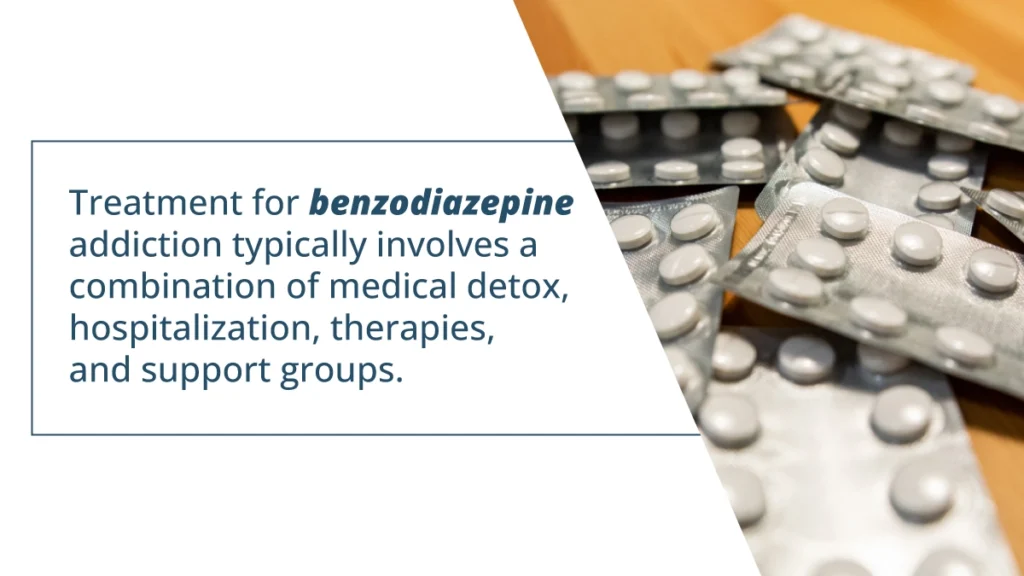Treatment for Benzodiazepine Addiction
Benzodiazepine addiction arises from the prolonged use of prescription medications like Xanax or Valium. These drugs, commonly prescribed for sleep and anxiety disorders, can lead to dependence, where individuals develop a reliance on them to function.
However, there is hope for those struggling with benzo addiction. Effective treatments are available to help individuals regain control of their lives. This article will explore these treatment options that aim to address both the physical dependence and the psychological aspects of substance use disorder (SUD).

Key Takeaways
Benzodiazepine addiction is a challenging condition, but effective treatments exist. Here is what this article covers:
- Addiction to benzos can manifest in the form of physical, psychological, and social signs, requiring early recognition for intervention.
- Benzodiazepine addiction can pose severe physical and mental health risks, alongside social and economic complications.
- From medical detox to behavioral therapy and support groups, a range of treatments is available for benzo addiction.
Struggling with addiction? Seek professional help at The Haven Detox-Little Rock. Call us at (501) 271-3342 for more information!
Signs and Symptoms of Benzodiazepine Addiction
While benzos can be effective when used as directed by a healthcare professional, misuse or prolonged use can lead to dependence and addiction. Here are the signs and symptoms of benzodiazepine addiction across different categories:
Physical Symptoms
The body undergoes various changes when struggling with benzo addiction, often manifesting in telltale physical signs, including:
- Tolerance: Needing higher doses to achieve the same effects.
- Withdrawal: Experiencing physical discomfort when not taking the drug.
- Changes in Appetite: Significant changes in eating patterns or weight.
- Sleep Disturbances: Trouble sleeping or experiencing irregular sleep patterns.
- Coordination Issues: Difficulty with balance and coordination.
- Headaches or Dizziness: Frequent headaches or episodes of dizziness.
- Gastrointestinal Problems: Digestive issues like nausea or constipation.
- Fatigue: Feeling persistently tired or lethargic.
Psychological Symptoms
Beyond the visible, the psychological impact of benzo addiction casts a profound shadow on one’s mental and emotional well-being. Symptoms include:
- Mood Swings: Unpredictable shifts in mood, from extreme highs to lows.
- Anxiety or Agitation: Increased anxiety levels when not taking the drug.
- Depression: Persistent feelings of sadness or hopelessness.
- Memory Problems: Difficulty remembering things or memory lapses.
- Confusion: Disorientation or mental fog.
- Irritability: Easily becoming agitated or annoyed.
- Concentration Issues: Difficulty focusing or sustaining attention.
- Cravings: Strong urges or cravings to use benzodiazepines.
Social and Behavioral Signs
The impact of benzodiazepine misuse extends beyond the individual, manifesting in social and behavioral changes such as:
- Isolation: Withdrawing from social activities or relationships.
- Doctor Shopping: Visiting multiple doctors to obtain more prescriptions.
- Neglecting Responsibilities: Failing to meet work, school, or family obligations.
- Risk-Taking Behaviors: Engaging in risky activities while under the influence.
- Financial Issues: Spending excessive money on acquiring the drug.
- Lying or Secrecy: Hiding or lying about benzodiazepine use.
- Legal Problems: Getting into legal trouble related to drug use.
- Loss of Interest: Losing interest in activities once enjoyed.
If you or someone you know is exhibiting these signs, seeking professional help and support is essential for managing benzodiazepine addiction.
Risks and Complications of Benzodiazepine Addiction
Benzodiazepines can pose several risks and complications when misused or taken for an extended period, leading to addiction. Here are some of the risks and complications associated with benzo addiction:
Physical Risks
Benzodiazepine addiction carries substantial physical risks, including:
- Dependency and Tolerance: Long-term benzodiazepine use can lead to tolerance, requiring high doses to achieve the same effects and potentially leading to dependence.
- Symptoms of Withdrawal: Abrupt cessation or reduction of benzodiazepine intake can result in intense withdrawal symptoms, including seizures, anxiety, insomnia, and even life-threatening complications.
- Overdose: Taking higher doses than prescribed or combining benzodiazepines with other substances (especially alcohol or opioids) can lead to overdose, causing respiratory depression, coma, or death.
- Physical Health Issues: Long-term benzodiazepine abuse may lead to physical health problems like gastrointestinal issues, cardiovascular problems, and weakened immune function.
Mental Health Risks
Apart from physical risks, benzodiazepine addiction poses mental health risks, including:
- Cognitive Impairment: Long-term use of benzodiazepines can affect cognitive function, leading to memory problems, difficulties concentrating, and impaired decision-making.
- Mental Health Disorders: Benzodiazepine addiction can exacerbate or trigger mental health issues like depression, anxiety disorders, and panic attacks.
- Psychological Dependence: There’s a risk of developing psychological dependence, making it challenging to function without the drug, leading to anxiety and distress when not using it.
- Increased Risk of Suicidal Thoughts: Some studies have suggested an increased risk of suicidal thoughts or behaviors in people misusing benzodiazepines.
Social and Economic Complications
Benzodiazepine addiction can ripple through various aspects of life, leading to social and economic complications, including:
- Relationship Strain: Addiction can strain relationships with family members, friends, and colleagues due to behavioral changes and mood swings.
- Financial Impact: The cost of obtaining benzodiazepines, coupled with potential job loss and legal issues, can lead to financial strain and instability.
- Work and Academic Issues: Decreased productivity, absenteeism, or problems at work or school may arise due to the impact of addiction on cognitive abilities and behavior.
- Social Isolation: Individuals struggling with benzodiazepine addiction may withdraw from social activities, leading to isolation and a lack of support.
Early intervention and proper treatment can mitigate these risks, improving physical and mental well-being while preventing social and economic hardships.
Treatment Options for Benzodiazepine Addiction
Recovering from benzo addiction involves a multifaceted approach that addresses both the physical and psychological aspects of dependency. Various treatment options exist, offering individuals pathways to regain control of their lives and break free from addiction.
Medical Detoxification
Medical detox, often the first step in benzodiazepine addiction treatment, involves supervised withdrawal in a controlled medical setting. This helps manage and alleviate the potentially severe withdrawal symptoms that may arise when discontinuing benzodiazepine use. Healthcare professionals monitor the process, ensuring the safety and comfort of the individual.
Residential Treatment
Residential or inpatient rehab programs provide a safe environment where individuals can focus entirely on their recovery. In a medical treatment facility, they receive round-the-clock care, counseling, and therapies to address the physical and psychological aspects of addiction. These programs are beneficial for those with severe addiction or co-occurring disorders.
Medication-Assisted Treatment (MAT)
Medication-assisted treatment programs involve the use of medications to help manage withdrawal symptoms and cravings during recovery. For benzodiazepine addiction, medications such as diazepam or clonazepam may be used under medical supervision to taper off benzos gradually. MAT is often combined with counseling and behavioral therapies for comprehensive treatment.
Behavioral Therapy
Behavioral therapy plays a crucial role in addressing the psychological aspects of benzodiazepine addiction. Cognitive-behavioral therapy (CBT) assists individuals in identifying and changing negative thought patterns and behaviors associated with drug use. It equips them with coping strategies, stress management skills, and tools for preventing relapse.
Support Groups
Support groups like Narcotics Anonymous (NA) or SMART Recovery provide a sense of community and understanding among individuals facing similar challenges. Sharing experiences, receiving encouragement, and learning from others’ journeys can be powerful motivators in recovery. These groups foster a supportive network that extends beyond formal treatment.
Lifestyle Changes
Making positive lifestyle changes is integral to sustaining recovery. This includes adopting healthy habits such as regular exercise, balanced nutrition, and sufficient sleep. Creating a stable routine and engaging in sober activities that promote overall well-being contribute to a holistic approach to recovery.
Benzo addiction treatment is not one-size-fits-all, and a combination of these approaches may be tailored to meet individual needs. Individuals must work closely with medical professionals to determine the most suitable treatment plan for their unique circumstances.
Frequently Asked Questions (FAQ)
What causes benzodiazepine dependence?
Benzo dependence arises when the brain adapts to the medication’s presence. Taking these drugs for an extended period alters the brain’s chemistry, leading it to rely on benzodiazepines to function normally. Over time, the body becomes accustomed to the drug, requiring higher doses for the same effect. This cycle of adaptation and increased tolerance contributes to the development of dependence.
How can you reduce the effects of benzodiazepines?
To lessen the effects of benzos, gradual reduction or tapering of the medication under medical supervision is recommended. This approach helps the body adjust slowly, minimizing withdrawal symptoms. In addition, healthy habits like regular exercise, a balanced diet, and sufficient sleep can support the body’s recovery process. It is crucial to consult healthcare professionals for guidance on reducing benzo use to manage its effects safely.
What is benzodiazepine withdrawal syndrome and its management?
Benzodiazepine withdrawal syndrome occurs when someone stops or reduces benzodiazepine use. Symptoms include anxiety, insomnia, and physical discomfort. Management involves a gradual tapering plan under medical supervision to minimize withdrawal effects. Supportive therapies, like counseling and behavioral interventions, can assist in managing symptoms.
Is there any non-addictive benzodiazepine?
There is no completely non-addictive benzodiazepine. While some may have a lower risk of dependence, all benzodiazepines carry the potential for addiction. It’s crucial to use these medications only as prescribed by medical professionals and to discuss any concerns or side effects with them.
Discover Renewed Freedom at The Haven Detox-Little Rock
Recovery is possible. At The Haven Detox-Little Rock, we’re here to guide you toward an addiction-free life and believe in your strength to overcome.
Our comprehensive treatment services begin with a medical detox program, ensuring a safe and supportive environment for your body to eliminate harmful toxins. Our residential program provides specialized medical care, therapy, and essential life skills vital for your recovery journey.
Your future is waiting. Reach out to us at (501) 271-3342 and reclaim your life. Don’t let drug addiction hold you back. You deserve a fresh start, and we’re here to support you every step of the way.





